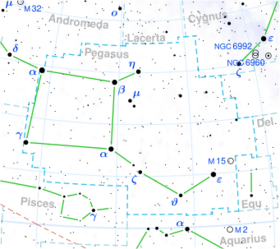Astronomy:35 Pegasi
| Observation data Equinox J2000.0]] (ICRS) | |
|---|---|
| Constellation | Pegasus |
| Right ascension | 22h 27m 51.52233s[1] |
| Declination | 4° 41′ 44.3916″[1] |
| Apparent magnitude (V) | 4.80[2] |
| Characteristics | |
| Evolutionary stage | horizontal branch |
| Spectral type | K0III[3] |
| U−B color index | +0.88[2] |
| B−V color index | +1.06[2] |
| Astrometry | |
| Radial velocity (Rv) | +54.16[4] km/s |
| Proper motion (μ) | RA: +77.57[5] mas/yr Dec.: −306.12[5] mas/yr |
| Parallax (π) | 21.0039 ± 0.2419[1] mas |
| Distance | 155 ± 2 ly (47.6 ± 0.5 pc) |
| Absolute magnitude (MV) | 1.50[6] |
| Details | |
| Mass | 1.18[6] M☉ |
| Radius | 8.5[7] R☉ |
| Luminosity | 31.69[8] L☉ |
| Surface gravity (log g) | 2.76[9] cgs |
| Temperature | 4,676[9] K |
| Metallicity [Fe/H] | −0.28[9] dex |
| Rotational velocity (v sin i) | 1.5[10] km/s |
| Age | 4.94[11] Gyr |
| Other designations | |
| Database references | |
| SIMBAD | data |
35 Pegasi is a single[13] star in the northern constellation of Pegasus. It is visible to the naked eye as a faint, orange-hued point of light with an apparent visual magnitude of 4.80.[2] The star is located approximately 155 light years away from the Sun based on parallax,[5] and is drifting further away with a radial velocity of +54 km/s.[4] The star has a relatively high proper motion, traversing the celestial sphere at the rate of 0.318 arc seconds per annum.[14]
This is an aging giant star[15] with a stellar classification of K0III,[3] having exhausted the hydrogen at its core and expanded to 8.5[7] times the Sun's radius. It is a red clump giant, indicating it is on the horizontal branch and is generating energy through helium fusion at its core.[15] The star is five[11] billion years old with 1.2[6] times the mass of the Sun. It is radiating 32[8] times the Sun's luminosity from its enlarged photosphere at an effective temperature of 4,676 K.[9]
There are two distant visual companions: component B, at an angular separation of 80.5″ and magnitude 10.0, and C, at separation 176.3″ and magnitude 10.64.[16]
References
- ↑ 1.0 1.1 1.2 Brown, A. G. A. (August 2018). "Gaia Data Release 2: Summary of the contents and survey properties". Astronomy & Astrophysics 616: A1. doi:10.1051/0004-6361/201833051. Bibcode: 2018A&A...616A...1G. Gaia DR2 record for this source at VizieR.
- ↑ 2.0 2.1 2.2 2.3 Ducati, J. R. (2002). "VizieR Online Data Catalog: Catalogue of Stellar Photometry in Johnson's 11-color system". CDS/ADC Collection of Electronic Catalogues 2237. Bibcode: 2002yCat.2237....0D.
- ↑ 3.0 3.1 Frasca, A. et al. (December 2009). "REM near-IR and optical photometric monitoring of pre-main sequence stars in Orion. Rotation periods and starspot parameters". Astronomy and Astrophysics 508 (3): 1313–1330. doi:10.1051/0004-6361/200913327. Bibcode: 2009A&A...508.1313F.
- ↑ 4.0 4.1 Famaey, B. et al. (2005). "Local kinematics of K and M giants from CORAVEL/Hipparcos/Tycho-2 data". Astronomy & Astrophysics 430: 165–186. doi:10.1051/0004-6361:20041272. Bibcode: 2005A&A...430..165F.
- ↑ 5.0 5.1 5.2 Van Leeuwen, F. (2007). "Validation of the new Hipparcos reduction". Astronomy and Astrophysics 474 (2): 653–664. doi:10.1051/0004-6361:20078357. Bibcode: 2007A&A...474..653V. Vizier catalog entry
- ↑ 6.0 6.1 6.2 Da Silva, Ronaldo et al. (2015). "Homogeneous abundance analysis of FGK dwarf, subgiant, and giant stars with and without giant planets". Astronomy & Astrophysics 580: A24. doi:10.1051/0004-6361/201525770. Bibcode: 2015A&A...580A..24D. Vizier catalog entry
- ↑ 7.0 7.1 Allende Prieto, C.; Lambert, D. L. (1999). "Fundamental parameters of nearby stars from the comparison with evolutionary calculations: Masses, radii and effective temperatures". Astronomy and Astrophysics 352: 555–562. Bibcode: 1999A&A...352..555A. Vizier catalog entry
- ↑ 8.0 8.1 Anderson, E.; Francis, Ch. (2012). "XHIP: An extended hipparcos compilation". Astronomy Letters 38 (5): 331. doi:10.1134/S1063773712050015. Bibcode: 2012AstL...38..331A. Vizier catalog entry
- ↑ 9.0 9.1 9.2 9.3 Wu, Yue et al. (2010). "Coudé-feed stellar spectral library – atmospheric parameters". Astronomy & Astrophysics 525: A71. doi:10.1051/0004-6361/201015014. Bibcode: 2011A&A...525A..71W.
- ↑ Massarotti, Alessandro et al. (January 2008). "Rotational and Radial Velocities for a Sample of 761 HIPPARCOS Giants and the Role of Binarity". The Astronomical Journal 135 (1): 209–231. doi:10.1088/0004-6256/135/1/209. Bibcode: 2008AJ....135..209M.
- ↑ 11.0 11.1 Luck, R. Earle (2015). "Abundances in the Local Region. I. G and K Giants". Astronomical Journal 150 (3): 88. doi:10.1088/0004-6256/150/3/88. Bibcode: 2015AJ....150...88L.
- ↑ "35 Peg". SIMBAD. Centre de données astronomiques de Strasbourg. http://simbad.u-strasbg.fr/simbad/sim-basic?Ident=35+Peg.
- ↑ Eggleton, P. P.; Tokovinin, A. A. (2008). "A catalogue of multiplicity among bright stellar systems". Monthly Notices of the Royal Astronomical Society 389 (2): 869. doi:10.1111/j.1365-2966.2008.13596.x. Bibcode: 2008MNRAS.389..869E.
- ↑ Lépine, Sébastien; Shara, Michael M. (March 2005). "A Catalog of Northern Stars with Annual Proper Motions Larger than 0.15" (LSPM-NORTH Catalog)". The Astronomical Journal 129 (3): 1483–1522. doi:10.1086/427854. Bibcode: 2005AJ....129.1483L.
- ↑ 15.0 15.1 Tautvaišienė, G. et al. (December 2010). "C, N and O abundances in red clump stars of the Milky Way". Monthly Notices of the Royal Astronomical Society 409 (3): 1213–1219. doi:10.1111/j.1365-2966.2010.17381.x. Bibcode: 2010MNRAS.409.1213T.
- ↑ Mason, Brian D. et al. (2001). "The 2001 US Naval Observatory Double Star CD-ROM. I. The Washington Double Star Catalog". The Astronomical Journal 122 (6): 3466. doi:10.1086/323920. Bibcode: 2001AJ....122.3466M. Vizier catalog entry
 |


